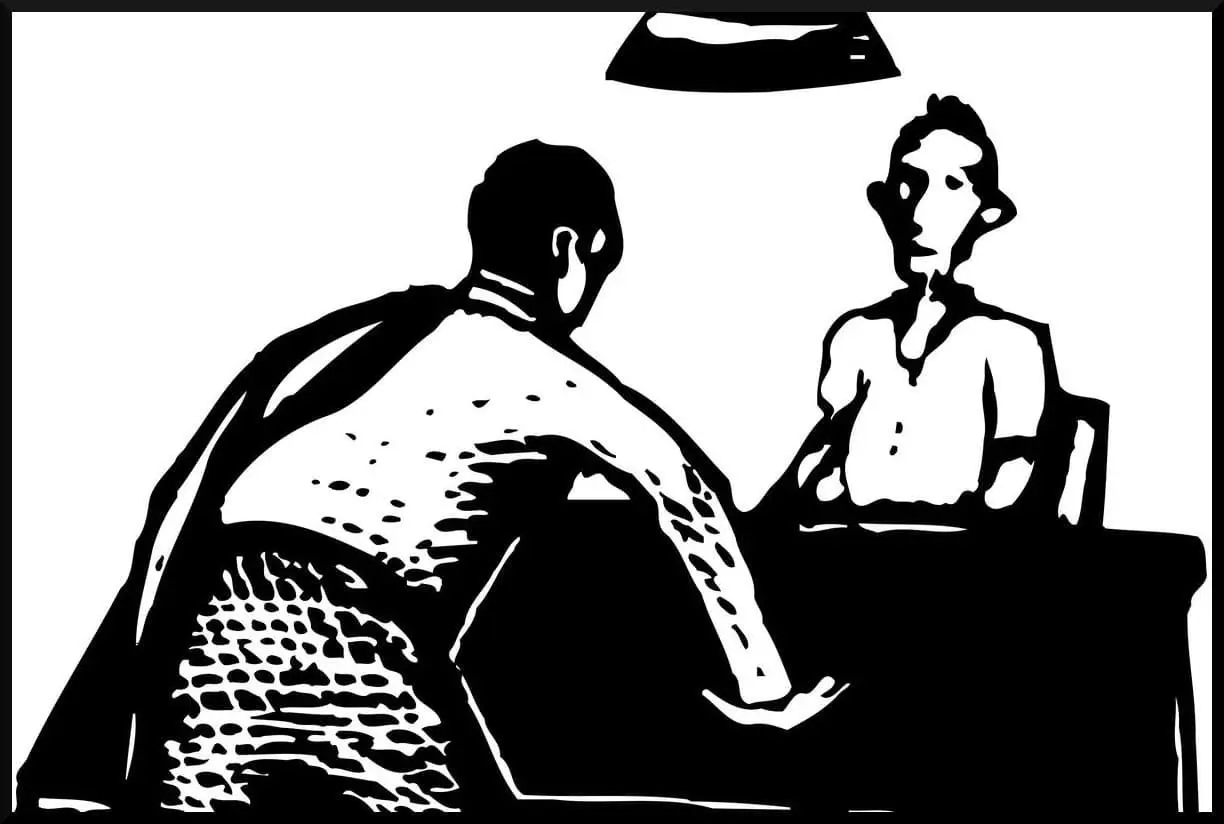By , Leave a Comment

Table of Contents
A Detective Calls
A detective calls. He’s investigating … something. He wants to speak with you. Wants to hear your side of the story. Doesn’t say he’s going to arrest you.
You feel scared. You feel like you should talk.
Always remember: Never speak to police.
Innocence Doesn’t Matter
Tell the truth. Tell a lie. Say a little or a lot. Innocent, guilty, or somewhere in between. It doesn’t matter. Police will arrest you no matter what you say.
They don’t tell you this up front. They’ll encourage you to believe otherwise.
The police want to speak with you because they think you did it. Most likely they already have cause to arrest you.
Even if you didn’t commit a crime, police possess some evidence tending to prove you did.
If one “witness” says he saw you commit a crime, the police have enough evidence to arrest you. It doesn’t matter if the witness is your mortal enemy; if the witness has a financial motive to falsely accuse you; if he’s a known liar.
No matter how innocent you are – no matter how charming and persuasive – you won’t talk your way out of getting arrested.
So don’t, under any circumstances, speak with police without having a lawyer physically present in the same room with you. (Being present is the only way your lawyer can cover your mouth with his hands to prevent you from speaking.)
Keep your lips sealed. Don’t give a written statement either. Don’t shake your head “yes” or “no”, or use any other body language.
Your words are extremely valuable. Keep them to yourself. Never speak to police. Use your constitutional right to remain silent. Always! No exceptions.
Why Shouldn’t You Speak with Police?
Sitting in a room with a couple of detectives, you won’t be able to imagine the many ways that speaking might harm you. So think about them now.
You’ll Confess to a Crime that You Committed
People confess their crimes to police. All the time. For all sorts of reasons.
Don’t do that.
If you feel the need, confess to your lawyer. No one else. Conversations with your lawyer about crimes you committed in the past are confidential: your lawyer may not repeat your confession to anyone.
Confess to your lawyer and no one else. Relieve your conscience without going to jail.
Once the urge to confess has passed (it will), you’ll be glad you didn’t speak with police.
You’ll Admit Facts that Tend to Prove You Guilty
When you speak with police, you risk unknowingly admitting facts that tend to prove you guilty.
You’ll admit being present when the incident occurred – mystery solved; police now know for certain you were there.
You’ll admit arguing with your accuser – oops; you just confirmed a motive for assaulting her.
You’ll admit having consensual sex with the person accusing you of a sex crime – now all the DA needs to prove is that you’re lying about consent; you admitted everything else.
Each admission is a nail in your coffin. Consider, instead, letting the police build their case without any help from you.
Never speak to police.
Don’t Speak to the Police
Schedule a FREE CONSULTATION with Bruce Yerman, Attorney at Law
You’ll Lie
Every innocent person knows of at least one fact that makes guilt appear more likely. The temptation to lie about such facts is great.
However, lying to police is a really bad idea.
If you tell just one lie that can be disproved, the District Attorney will have a basis to persuade a jury that your lie proves “consciousness of guilt” – that is, a) you lied to hide the truth, and b) only guilty people do that.
This would be an unfortunate turn of events, especially if you’re innocent.
(Notice from these last two examples, whether you lie or tell the truth, you’re worse off than if you say nothing.)
The Detective Will Misunderstand You
You don’t have a constitutional right to be interrogated by an unbiased detective with perfect listening skills.
And let’s be frank, you don’t always express yourself with unerring precision.
If something gets lost in translation (it will), you and only you will pay the price.
The Detective Won’t Remember Everything You Say
There’s no way the detective will remember everything you say.
The detective won’t record your conversation. He won’t take notes while you’re speaking. In fact, he won’t begin writing down anything you say until a couple hours after he’s done speaking with you.
Unfortunately, the detective will tend to remember the parts of the conversation consistent with guilt, while forgetting the parts consistent with innocence.
That’s because the detective’s goal in speaking with you is to prove you’re guilty, not to determine the truth.
The Detective Will Lie
Solving crimes is hard work. The NYPD has lots of crimes to solve.
For the detective who interrogates you, perhaps the temptation to “solve” the case – by inventing evidence from words you never spoke – is irresistible.
The detective might falsely claim you made incriminating statements that in fact you never made. This happens a lot more than you’d imagine.
Really. No matter how much you imagine that this might happen, it happens more.
You can’t afford the risk that the detective will lie. So never speak to police.
You’ll Confess to a Crime You Didn’t Commit
Detectives are trained to use techniques designed to elicit confessions. These techniques include lying, false promises, force, intimidation, threats, sleep deprivation, bathroom deprivation, hunger, fear of jail, fear of ACS taking your children, and other forms of psychological coercion.
These techniques are so effective that they often cause innocent people to confess to crimes they didn’t commit – to end their pain.
Stop interrogation before it starts to avoid this terrible outcome.
Say Nothing
Assert your right to silence. Always. Never speak to police.
You shouldn’t lie to the police, but you can, and always should, remain silent. All you have to do is say nothing.
Better yet, tell police you need a lawyer. In New York, requesting a lawyer requires police to stop questioning you until you have a lawyer present.
Your answer to every police question should be: “I need a lawyer.” If a detective asks you 1,000 questions, repeat “I need a lawyer” 1,000 times.
When police contact you, immediately retain a lawyer.
Your lawyer should consult with you right away. The lawyer should inform the detective that you’re represented by counsel, and that the detective may not speak with you. By doing this, your lawyer will prevent the detective from legally questioning you.
However, if the detective illegally questions you, remain vigilant and never speak to police.
Silence Didn’t Cause Police to Arrest You
After you remain silent or demand a lawyer, police will arrest you.
Don’t let this turn of events cause you to speak!
There is no cause and effect between your silence and getting arrested. Silence isn’t evidence. It can’t cause police to arrest you.
Demanding a lawyer isn’t evidence either. It can’t cause police to arrest you.
Police may arrest you if evidence gives them “probable cause” to do so.
If police arrest you, it’s not because you remained silent or because you demanded a lawyer.
The detective’s plan is to speak with you, hoping you’ll confess; then arrest you, whether or not you speak. So never speak to police.
If you find out that police want to question you or arrest you, contact a criminal defense lawyer immediately.
Free Consultation
Bruce Yerman is a criminal defense lawyer in New York City. His office is located in Suite 1803 of 299 Broadway in Manhattan.
If you’d like a free consultation to discuss criminal defense or family law, call Bruce at:
Or email Bruce a brief description of your situation:

Leave a Reply